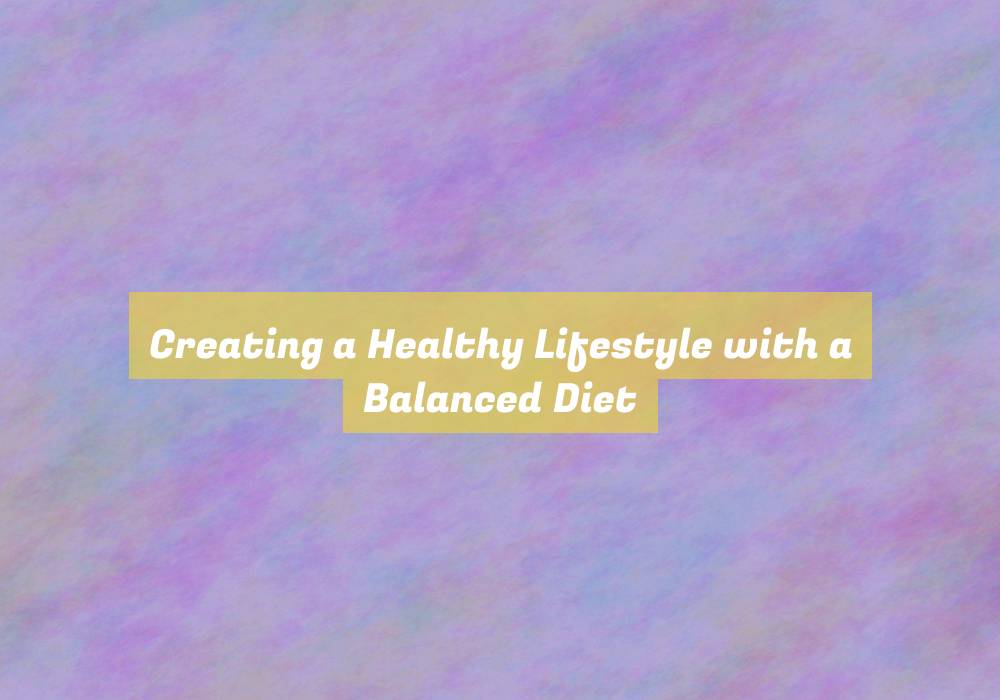Creating a Healthy Lifestyle with a Balanced Diet
Imagine your body as a well-oiled machine, fueled by the nutrients and energy it needs to function at its best.
Just as a car requires the right fuel to run smoothly, your body also thrives when you provide it with a balanced diet.
But what exactly does that entail, and how can you achieve it in the midst of busy schedules, tempting treats, and conflicting dietary advice?
LetG??s explore how you can create a healthy lifestyle through a balanced diet, and why itG??s worth the effort to make it a priority.
Benefits of a Balanced Diet
Enjoy improved energy levels and overall well-being by maintaining a balanced diet rich in essential nutrients. When you consume a variety of fruits, vegetables, whole grains, lean proteins, and healthy fats, you provide your body with the necessary fuel to function optimally.
A balanced diet not only supports physical health but also has a significant impact on your mental well-being. By nourishing your body with the right nutrients, you can enhance your mood and cognitive function, reducing the risk of depression and anxiety.
Additionally, a balanced diet can contribute to maintaining a healthy weight, reducing the risk of chronic diseases such as heart disease, diabetes, and certain cancers. By incorporating a range of nutrients into your meals, you support your immune system, making your body more resilient to illnesses and infections.
Furthermore, a balanced diet can improve your digestion and gut health, leading to better nutrient absorption and a reduced risk of digestive issues.
Practical Tips for Healthy Eating
Achieving a balanced diet involves incorporating diverse food groups to ensure optimal nutrition and wellness. Start by planning your meals ahead of time. This helps you make healthier choices and avoid impulse eating.
When grocery shopping, focus on filling your cart with fresh fruits, vegetables, lean proteins, whole grains, and healthy fats. Opt for colorful produce to ensure you get a variety of nutrients. Be mindful of portion sizes, as overeating, even healthy foods, can lead to weight gain.
Additionally, aim to cook at home as much as possible. This gives you better control over the ingredients and cooking methods, reducing your intake of unhealthy additives and excessive fats. Experiment with herbs and spices to add flavor to your dishes without relying on excessive salt or sugar.
Lastly, stay hydrated by drinking plenty of water throughout the day. Sometimes, thirst can be mistaken for hunger, leading to unnecessary snacking.
Building Healthy Eating Habits
To build healthy eating habits, start by implementing small changes in your daily food choices and meal preparation. Begin by incorporating more fruits and vegetables into your meals. Instead of completely overhauling your diet, try adding a serving of fruit to your breakfast or incorporating a side of vegetables with your dinner. Gradually reducing your intake of processed foods and sugary snacks can also contribute to healthier eating habits. Swapping out soda for water or herbal tea, and choosing whole foods over packaged snacks, can make a significant difference.
Another essential aspect of building healthy eating habits is being mindful of portion sizes. Pay attention to your bodyG??s hunger and fullness cues, and try to serve yourself appropriate portions. Eating slowly and savoring each bite can help you recognize when youG??re satisfied, preventing overeating. Additionally, planning and preparing your meals in advance can help you make more nutritious choices. By setting aside time for meal prep, you can ensure that you have healthy options readily available, making it easier to stick to a balanced diet.
Maintaining Long-Term Wellness
As you continue to prioritize healthy eating habits, maintaining long-term wellness involves sustaining these positive changes by incorporating regular physical activity into your routine. Physical activity is essential for keeping your body strong and healthy. It helps in managing weight, reducing the risk of chronic diseases, and improving overall mental well-being. Aim for at least 150 minutes of moderate-intensity exercise per week, such as brisk walking, swimming, or cycling. Additionally, incorporating strength training exercises at least twice a week is beneficial for maintaining muscle mass and bone density as you age.
In addition to regular exercise, itG??s important to stay mindful of your food choices. Continue to focus on consuming a variety of nutrient-dense foods, including fruits, vegetables, whole grains, lean proteins, and healthy fats. Be mindful of portion sizes and practice mindful eating to avoid overeating. Prioritize hydration by drinking an adequate amount of water throughout the day.
Furthermore, prioritize regular health check-ups and screenings to monitor your overall well-being. Establish a good support system and seek professional help if needed to address any mental or emotional concerns that may impact your long-term wellness. By staying committed to these habits, you can maintain your overall well-being and enjoy a healthy, balanced lifestyle for years to come.
Conclusion
In conclusion, by incorporating a balanced diet into your lifestyle, you can experience numerous benefits such as improved energy levels, better weight management, and a reduced risk of chronic diseases.
Remember to focus on eating a variety of nutritious foods, practicing portion control, and staying hydrated.
By building healthy eating habits and making long-term wellness a priority, you can create a sustainable and enjoyable approach to nourishing your body and mind.




